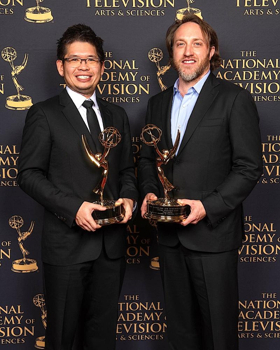
The Oscar and Tony were named after individuals, but the Emmy was named after a piece of technology - So every time an actor receives televisions highest honor, they are in fact paying tribute to the technology that made their careers possible.
"The National Academy of Television Arts & Sciences and it's thousands of members across the country take great pride in the history of The Technology Emmy* Awards as one of the first Emmy* Awards ever presented, now celebrating its 70th anniversary," remarks Terry O'Reilly (Chairman of the National Academy of Television Arts & Science). "Our honorees tonight have taken the the lead in innovation and technology, creating a world that even their predecessors could only have imagined back in 1949."
Adam Sharp (President of the National Academy of Television Arts & Sciences) adds, "This year we recognize honorees in twelve categories that continue to push the technology envelope, by enhancing the viewing experience and the 'Science' of creating television."
Among the highlights for the evening was the Lifetime Achievement Emmys presented to
Youtube co-founders Chad Hurley and Stephen Chen.
Remember the first
Youtube video ever? Probably not. It was 19 seconds long and supremely boring, consisting of one early
Youtube staff standing in front of an elephant paddock at the San Diego zoo. "They have really really really Long trunks, and that's cool." We've come along way since "Meet me at the zoo."
Today, the video-mad citizens of the world upload 576,000 hours of video to
Youtube every single day about 66 years worth and we watch 1 billion hours worth of
Youtube every day. 1.8 billion people login to
Youtube every month a quarter of the earths population. The really amazing part of the story, though, is that the
Youtube we know was never the founders intention. The story begins at PayPal. Into thousand two, eBay bought the company in reaching its employees, including Chad Hurley and Steven Chen, then 28 and 26. Flush with money to start something new they came up with a vision for a video dating site. Desperate to get people on the site
Youtube ran ads on craigslist in Los Angeles and Las Vegas offering women $20 for every video they uploaded. Not a single woman replied.
When that concept didn't pan out
Youtube creators began describing it as a site for posting video messages for designated friends. By the fall of 2005 YouTube's eventual model had crystallized, a site where anyone could upload any video to be viewed by anyone.
What you may have forgotten was that
Youtube wasn't the first sight with that goal. By one estimate, there were already over 250 video sharing sites at the time, including, by the way, something called Google video.
But
Youtube eventually crushed them all to dust. Lots of experts have lots of explanations, but a lot of it boils down to a smart and simple design. You didn't have to know your videos resolution or codec, you could upload anything, and you tubes algorithms would convert it to a single uniform format (Flash) that played everywhere.
You could also copy and paste individual videos URLs, and even embed
Youtube videos on other websites, which helped its growth immensely. And let's not forget the importance of the "views" tally on every video, which appealed to uploader's egos and insured and ever larger torrent of uploads.
The highlights of YouTube's evolution are well known at this point: Google bought the company 2006 for 1.65 billion. Preroll ads began playing in 2007. The site began excepting 1080P HD videos in 2009, and for cave areas in 2010.
Along the way,
Youtube manage to touch, change, or disrupt every aspect of life and culture. TED Talks, freely Khan Academy courses, and billions of how to videos changed the nature of education. Obamas 2008 campaign, Live-streamed presidential debates, and Partisan clips from talking head on earth change politics. Instant access to teasers, trailers, and fall shows transformed the marketing of TV, movies, and music.
Now that smart phone cameras have made everyone a journalist,
Youtube has changed the course of news. And YouTube's ability to bypass traditional gatekeepers like agents and studios have changed the way talented performers are discovered and paid.
Not all of YouTube's cultural affects have been sunshine and bunnies, of course. Musician say that it kills their income. Parents and educators worry about
Youtube addictions affects on young minds. The site has had to contend with one conflict after another, like copyright infringement, hate speech, conspiracy theorists, fake news, and all those videos about eating Tide Pods.
And, of course,
Youtube has also done a real number on television viewership. Somehow, though,
Youtube survives and thrives, thanks to the DNA that Hurley and Chen instilled into the company they founded over a decade ago: smart design, dedication to simplicity, and a willingness to change course in a heartbeat. Those factors, it turns out, are the keys to building an empire by accident.
*** Previous editorial is contributed by David Pogue (CBS Sunday Morning correspondent, NOVA Host and NY Times columnist), courtesy of the National Academy of Television Arts and Sciences (NATAS).
PHOTO CREDIT: by Marc Bryan-Brown, Roxxe Ireland Photography
Comments
To post a comment, you must
register and
login.




